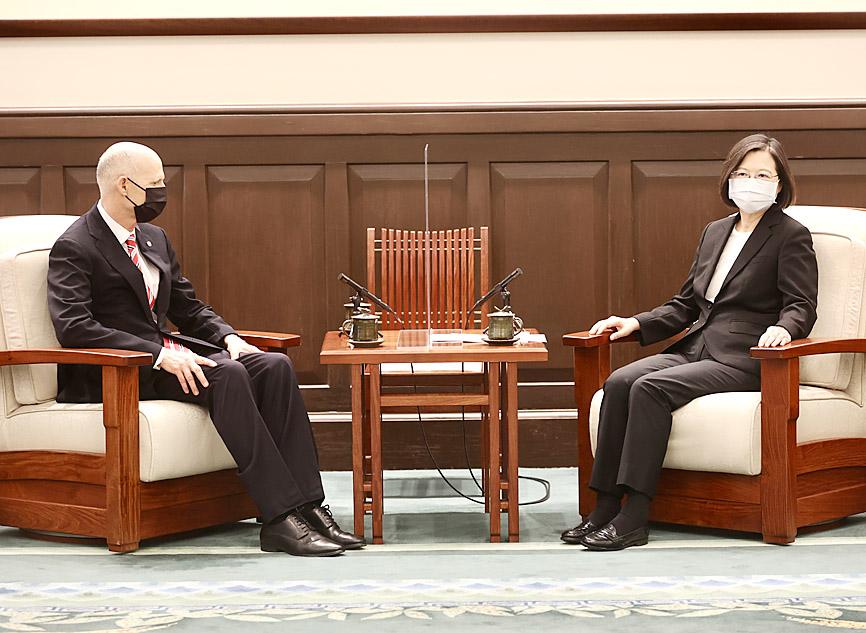The US should work with its partners to help Taiwan defend its freedom, US Senator Rick Scott told President Tsai Ing-wen (蔡英文) at a meeting yesterday.
The US and all other freedom-loving countries should work together to “make sure that Taiwan has the opportunity to decide their future, not have it decided by some foreigner,” said Scott, who is on a three-day visit to Taipei.
Scott, who took office as senator after his two terms as Florida governor ended in 2019, said the international community should continue working together to make sure Taiwan is well-positioned to defend its freedoms, referring to China’s growing influence in the Indo-Pacific region.

Photo: CNA
He said that as a member of the US Senate committees on armed services and commerce, he remains committed to the freedoms and security of Taiwan.
He said that he also looked forward to meeting with Taiwanese officials and business leaders to discuss ways to increase bilateral trade.
Tsai said there is a need for “democratic partners to deepen cooperation” in light of several challenges facing the world in the past few years, including, the expansion of authoritarianism, the COVID-19 pandemic and Russia’s invasion of Ukraine.
“Taiwan will continue to work closely with the US to jointly safeguard the stability and prosperity of the Indo-Pacific region,” she said.
Taipei has policies to grow bilateral trade, she said, citing ongoing talks with Washington about the US-Taiwan Initiative on 21st Century Trade and a Taiwanese trade delegation that visited the US last month.
PRO-TAIWAN BILLS
She thanked the Republican senator for twice in the past two years introducing a bill that would be crucial for the security of Taiwan, referring to the proposed Taiwan invasion prevention act.
Scott was the first US visitor to the Taiwan Representative Office in Lithuania and he exemplifies the partnership between the democracies, she added.
She hopes that Taiwan’s partnership with the US will become stronger and closer with Scott’s continued support, she said.
After the meeting, Scott told reporters he believes that “the world has changed” following Russian President Vladimir Putin’s actions in Ukraine.
“We all have to put ourselves in a position that we can make sure we defend the freedom we all believe in,” he said.
“I do think it would be helpful if Taiwan participated in RIMPAC and I hope that’s what happens in the future,” he said, referring to the Rim of the Pacific exercise, the world’s largest international maritime drills.
In the US-led format’s ongoing edition, 26 nations have since last month been participating in drills around Hawaii and southern California.
Additional reporting by Lee Hsin-fang and Reuters

CHAOS: Iranians took to the streets playing celebratory music after reports of Khamenei’s death on Saturday, while mourners also gathered in Tehran yesterday Iranian Supreme Leader Ayatollah Ali Khamenei was killed in a major attack on Iran launched by Israel and the US, throwing the future of the Islamic republic into doubt and raising the risk of regional instability. Iranian state television and the state-run IRNA news agency announced the 86-year-old’s death early yesterday. US President Donald Trump said it gave Iranians their “greatest chance” to “take back” their country. The announcements came after a joint US and Israeli aerial bombardment that targeted Iranian military and governmental sites. Trump said the “heavy and pinpoint bombing” would continue through the week or as long

TRUST: The KMT said it respected the US’ timing and considerations, and hoped it would continue to honor its commitments to helping Taiwan bolster its defenses and deterrence US President Donald Trump is delaying a multibillion-dollar arms sale to Taiwan to ensure his visit to Beijing is successful, a New York Times report said. The weapons sales package has stalled in the US Department of State, the report said, citing US officials it did not identify. The White House has told agencies not to push forward ahead of Trump’s meeting with Chinese President Xi Jinping (習近平), it said. The two last month held a phone call to discuss trade and geopolitical flashpoints ahead of the summit. Xi raised the Taiwan issue and urged the US to handle arms sales to

State-run CPC Corp, Taiwan (CPC, 台灣中油) yesterday said that it had confirmed on Saturday night with its liquefied natural gas (LNG) and crude oil suppliers that shipments are proceeding as scheduled and that domestic supplies remain unaffected. The CPC yesterday announced the gasoline and diesel prices will rise by NT$0.2 and NT$0.4 per liter, respectively, starting Monday, citing Middle East tensions and blizzards in the eastern United States. CPC also iterated it has been reducing the proportion of crude oil imports from the Middle East and diversifying its supply sources in the past few years in response to geopolitical risks, expanding

Pro-democracy media tycoon Jimmy Lai’s (黎智英) fraud conviction and prison sentence were yesterday overturned by a Hong Kong court, in a surprise legal decision that comes soon after Lai was jailed for 20 years on a separate national security charge. Judges Jeremy Poon (潘兆初), Anthea Pang (彭寶琴) and Derek Pang (彭偉昌) said in the judgement that they allowed the appeal from Lai, and another defendant in the case, to proceed, as a lower court judge had “erred.” “The Court of Appeal gave them leave to appeal against their conviction, allowed their appeals, quashed the convictions and set aside the sentences,” the judges